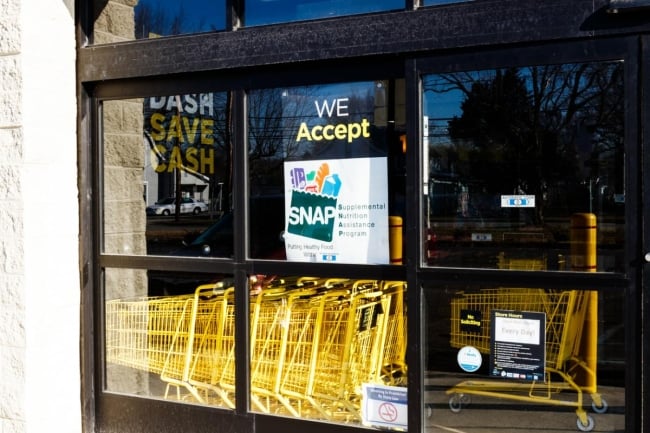You have /5 articles left.
Sign up for a free account or log in.

Istockphoto.com/jetcityimage
Advocates have long argued against requirements college students must meet to be eligible for the federal Supplemental Nutrition Assistance Program, or SNAP.
Dozens of states pleaded the same case as the coronavirus pandemic spread throughout the country. The federal assistance program requires students who attend college at least half-time to work 20 hours per week to qualify. As the pandemic causes a recession and unemployment skyrockets, state officials said students are being left in the lurch.
But the U.S. Department of Agriculture's Food and Nutrition Service agency denied the states' request.
It's unclear how many students are affected by this decision because there isn't much data on it, according to Lauren Walizer, a senior policy analyst at the Center for Law and Social Policy (CLASP). But some of the states provided estimates for how many students currently receive SNAP benefits, or estimates for how many additional students would gain eligibility, in their waiver requests. For example, Illinois said about 11,000 people who currently receive SNAP are college students. New Hampshire estimates another 6,800 people would become eligible for SNAP, in addition to the students who are currently eligible.
A report from the U.S. Government Accountability Office also found that nearly half of the students who would be eligible for SNAP do not receive the assistance. It's likely, given the current crises, that even more students will need assistance. But many will not be able to meet the work requirements.
CLASP is disappointed in the agency's decision, said Ashley Burnside, a policy analyst there.
"The COVID-19 pandemic will make it harder for students to work, to earn a living wage and to access food for themselves and their families. Students shouldn’t have to choose between feeding themselves and breaking social distance in a public health crisis. Now more than ever, students need access to SNAP food assistance benefits for the duration of the COVID-19 medical emergency," she said via email.
"Even during normal times, student eligibility rules for SNAP are complicated and prevent many students who are eligible from getting food assistance that would help them do better in school and remain economically secure," Burnside said. "During the COVID-19 crisis, students have been forced to leave their campuses and many now need to self-quarantine to protect themselves, their families and their communities."
Before the COVID-19 pandemic, nearly 40 percent of students reported being food insecure to some extent, Burnside said. It's possible more students will need SNAP now, and that students who are currently eligible will lose that eligibility as they lose their jobs or work hours.
Burnside recommends states help students enroll in SNAP through other exemptions, such as students who have caregiving responsibilities. States can also use their authority to provide good-cause exemptions, she said.
While much of the data is unknown, Walizer said it's safe to say people need more help now, not less.
"Given what is known about widespread struggle in the country right now, I think it's reasonable to assume students are more likely to be struggling than safe," she said. "That's why the waivers matter, because it allows states to adopt a 'better safe than sorry' approach that focuses on protecting people's benefits and accounts for the reality of our worldwide circumstances."
The widespread requests to waive the student rules for SNAP also prove many advocates' points, she said.
"Clearly, [states] don't think they are sensible, particularly in a time like this."




